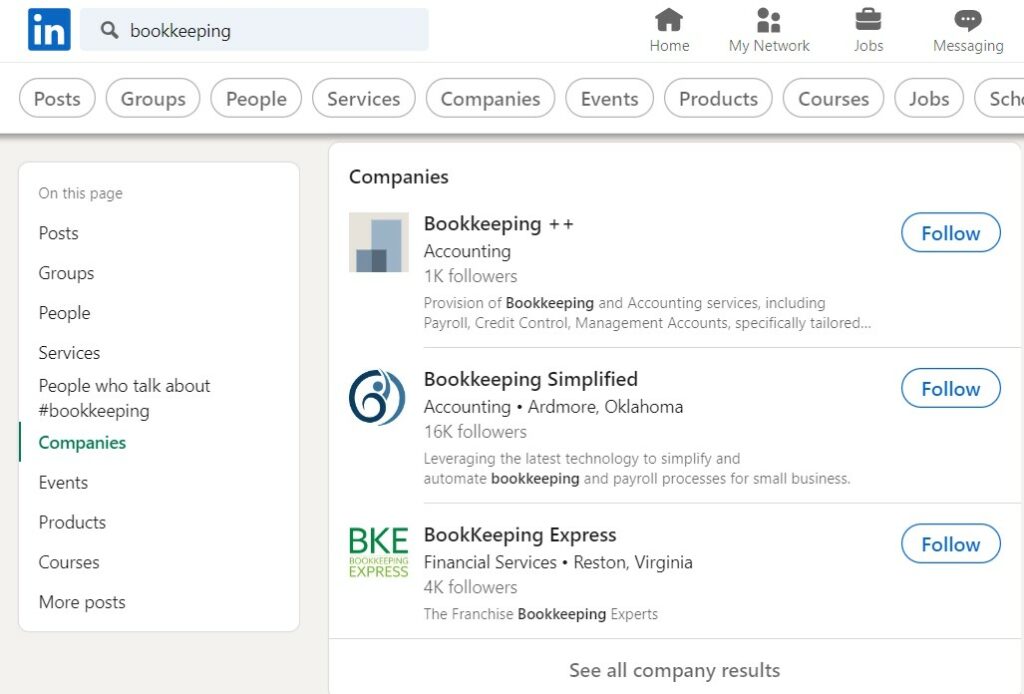If you ask bookkeepers what's harder, their job or bookkeeping marketing, most of them would probably vote for the latter.
While the task of managing financial records is undoubtedly challenging, marketing for bookkeepers presents its own unique — and probably more difficult — set of hurdles.
After all, running a bookkeeping business is (relatively) easy if you know how to attract and retain prospective clients with a successful marketing strategy.
If you’re still not sure how to do that, read on to see nine marketing tactics to get more bookkeeping clients.
Marketing ideas for bookkeepers
- Build a credible website
- Search engine optimization is a must
- Google My Business: Help potential clients discover your firm
- Attract bookkeeping clients with advertising
- Networking is priceless
- Give incentives for business referrals
- Don’t neglect email marketing
- Bookkeepers also need social media marketing
- Create authoritative content for all of your channels
How to prepare for bookkeeping marketing

Before we dig into details, it’s important to emphasize a few general rules that almost all businesses — not just bookkeepers — should follow. This is how you prepare for bookkeeping marketing:
Focus on a specific niche
Being a jack-of-all-trades might seem appealing, but specializing in a specific niche is a simple way to set yourself apart. This usually means identifying a target audience or industry that aligns with your expertise.
For instance, you might specialize in providing bookkeeping services for small businesses in the hospitality sector or freelance creatives. If you do it like that, it’s easier to tailor your marketing efforts.
Define your voice
Your brand's tone of voice is its personality. It's how you communicate with your audience and convey your values. Two things are particularly important:
- The style that resonates with your chosen niche and prospective clients
- Your personality and communication style
By bringing together these two components, you can build a unique voice for your marketing strategy. Consistency is key — use the same brand voice in all your marketing materials, from social media posts to website content.
Keep your efforts focused
Less is more in marketing, especially for small business owners. Instead of trying to be everywhere at once, focus your efforts on a few strategic channels.
Research where your target audience spends their time to concentrate your digital marketing activities there. For instance, your small business probably doesn’t need an Instagram account if your audience is on LinkedIn.
Remember, quality engagement on well-selected platforms is more valuable than a scattered presence across many.
Related: Online marketing ideas for accountants
9 ways to market your bookkeeping business
We could talk about dozens of traditional and digital marketing tactics for your bookkeeping business, but the goal is to help you keep your efforts focused (as mentioned in the previous section).
That’s why we selected only nine essential tactics.
Note:
Many marketing channels are very hard to measure, which is particularly daunting for a business owner. That’s why we’ll give you practical hints for each tip on our list.
1. Build a credible website

More often than not, your website will be the first point of contact for potential clients. This means that the web presentation of your bookkeeping services becomes a crucial tool in establishing professional credibility.
Visitors should immediately understand what services you offer when they land on your website. Your job is to craft a clear and straightforward value proposition that highlights your unique selling points as a bookkeeper.
But that’s just the tip of the iceberg.
Users reportedly form an opinion about a website in less than a second. In such circumstances, your site needs to fulfill many other conditions to become truly attractive and eye-pleasing. Here are some tips on how to achieve that:
- Website design speaks volumes about your professionalism, so you better create a clean and easy-to-navigate layout
- Create a dedicated "About" section to provide an overview of your experience, certifications, and other relevant qualifications
- Include testimonials to build social proof and instill confidence in potential clients
- Try to incorporate visually appealing elements (infographics, charts, images, etc.) to make your bookkeeping business site more engaging
- Make it easy for visitors to get in touch with you by adding a direct call to action
How to measure success?
Monitor website traffic using tools like Google Analytics. Track metrics such as the number of visitors, page views, average session duration, and bounce rate. An increase in these metrics indicates successful marketing efforts in driving more qualified leads to your website.
Set up conversion tracking on your website to measure specific actions taken by visitors, such as form submissions, inquiries, or service sign-ups. This helps you directly measure the impact of your marketing efforts on lead generation and customer acquisition.
Related: Places to go to to get web design inspiration
2. Search engine optimization is a must

Do you know that there are over 1.5 billion websites on the Internet? OK, 80% of them are inactive, but it still leaves you with hundreds of millions of other sites to compete with.
That’s why every website needs search engine optimization (SEO). It’s a process that gives your website:
- Targeted traffic
- Greater discoverability
- Authority from the perspective of search engines like Google
- Long-term visibility of your bookkeeping business
Now, SEO is both an art and a science, so it’s hard to cover it all in a single section. That’s why we’ll just breeze through the basics.
Firstly, you should always search for relevant keywords and/or phrases that potential clients use when searching for bookkeeping services. This task is much simpler if you operate in a well-selected niche.
Secondly, you should regularly audit your website for technical issues that might affect its performance. The usual suspects include things like duplicate content, broken links, crawl errors, and so on.
The third tip is to create accurate meta titles and descriptions for each webpage. Meta elements appear in search results and often encourage users to click through to your site.
You must also publish well-optimized and high-quality content, but we’ll discuss that in one of the following sections.
How to measure success?
Monitor your website's search engine rankings for relevant keywords. Track organic traffic, impressions, and click-through rates from search engine results pages (SERPs) to assess the effectiveness of your SEO efforts.
Related: SEO for accounting firms
3. Google My Business: Help potential clients discover your firm
Google My Business is Google’s native platform designed specifically for improving the visibility of businesses and organizations in local searches. You can create and manage a business listing for free, and it will appear when users search for a bookkeeping service in their vicinity.
For instance, many people search for “bookkeeping services near me”. When you create an account using Google My Business, your listing will appear (among others) to provide users with basic information about your firm.

The most important tip about GMB is to keep your business information accurate and updated. That means providing the right details about your business hours, contact information, images, web and physical addresses, and similar.
How to measure success?
The good thing about Google My Business is that it comes with comprehensive analytics. That way, you can figure out many details about the overall view count, local search performance, CTR, and many other metrics relevant to your bookkeeping services.
4. Attract bookkeeping clients with advertising
No matter how good, organic strategies like SEO and Google My Business can only take you so far in your attempt to get more bookkeeping clients. Advertising supplements the two by offering a more immediate and targeted way to reach potential clients.

Most firms opt for PPC (pay-per-click) advertising, particularly Google Ads because it helps them create targeted messages that appear at the top of search engine results. With Google search ads, you only pay when someone actually clicks on your ad.
This means you’re reaching users who are actively searching for bookkeeping services, making it a highly effective way to connect with clients who are already interested in what you offer.
How to measure success?
PPC platforms like Google Ads give you analytics tools to monitor relevant metrics like CTR or cost per conversion. That way, you can quickly adjust your campaigns and optimize your advertising budget.
5. Networking is priceless

Digital marketing tactics are dominant, but you should never underestimate the value of old-fashioned networking. Technology transformed the way we connect, but the principles of networking remain timeless.
Networking allows you to meet people face-to-face and establish a genuine connection that goes beyond digital interactions. It enables you to build successful client relationships while increasing the chances of earning referrals from colleagues, partners, and other bookkeeping professionals.
How to measure success?
You can evaluate the success of your networking efforts by tracking the number of new partnerships formed and the resulting leads acquired through these relationships. While this isn’t the exact science, it’s a simple way to evaluate your actions.
6. Give incentives for business referrals

This tip aligns with the previous one, and it could get you a lot of new bookkeeping clients if done properly. The best way to encourage referrals is by offering incentives to clients or business partners who refer potential clients to your bookkeeping business.
Of course, the key thing is to determine the incentives you'll offer for successful referrals. We’ll give you a few practical suggestions:
- Discounts on your bookkeeping services
- Gift cards
- A percentage of the first project's fee
In each case, these or other creative incentives should always align with your client’s preferences to become truly effective.
How to measure success?
You can analyze referral programs by tracking the number of recommendations received and the conversion rate of referred leads.
7. Don’t neglect email marketing

Marketing channels come and go, but email seems to be eternal — and so you cannot afford to neglect it. We’ll explain a few core principles of email marketing for bookkeeping firms:
- Focus on growing a quality email list with highly targeted subscribers
- Segment your contacts based on relevant criteria such as demographics, interests, services provided, and/or behavior
- Keep a consistent emailing schedule to keep your subscribers engaged. For instance, weekly or bi-weekly newsletters foster anticipation and familiarity
- Most people don’t read past headlines, so your subject lines have to be compelling enough to encourage recipients to read the entire message
- Each email should clearly state the action you want recipients to take after checking the message. Some examples include downloading a learning resource, scheduling a consultation, or visiting your website
How to measure success?
Email marketing campaigns rely on metrics like open rates and conversions. These indicators will help you tailor emails in a way that suits your subscriber groups, so you can drive engagement in the long run.
8. Bookkeepers also need social media marketing

Social media marketing is a dynamic tool that enables you to connect, network, educate, and engage potential clients on a broader scale.
How come?
Well, that’s because the number of social media users is close to five billion.
Only a fraction of those will be your followers, but the point is that social networks can effectively boost your online visibility. This requires continuous thought leadership efforts, but it pays off by growing your reach and helping you build professional credibility.
How to measure success?
Measure the success of your social media marketing by tracking metrics like followers, engagement (likes, shares, comments), and click-through rates for links to your website.
Related: Social media marketing for accountants: The ultimate guide
9. Create authoritative content for all of your channels

This tip applies to ALL of your marketing channels. From your business website to Google ads, every piece of content must reflect your professional authority and unique style.
And it should be focused, too.
The goal is to understand the challenges your potential clients face and address them through your content. Solving real problems will demonstrate your expertise and position you as a solution provider.
How to measure success?
You can measure the impact of your content marketing activities by analyzing individual posts across all channels.
Keep in mind it’s a long-term process that requires continuous analysis and the corresponding adjustments, but you should be able to quickly figure out what your audience likes and dislikes.
Should you outsource bookkeeping marketing?
With so many things to do, a bookkeeping business owner may as well feel intimidated by marketing.
So, should you outsource the whole thing?
We can’t answer this question on your behalf, but we can help you make the right decision.
Here’s what you’ll need to successfully create, manage, adjust, and analyze marketing campaigns:
- Time
- Manpower
- In-house skills
- Access to marketing tools
If you have all four, you can manage marketing activities on your own.
But if you don’t, it’s probably best to outsource it.
Market your bookkeeping firm the right way
Getting new clients is one of the most pressing business concerns for a bookkeeper, and it requires a well-thought marketing plan. We showed you nine tactics that should work well for a professional bookkeeping business.
Ideally, you’d use all of these tips to expand your client base, but your job is to focus on those that best suit your firm.
Which ones would you pick first?



